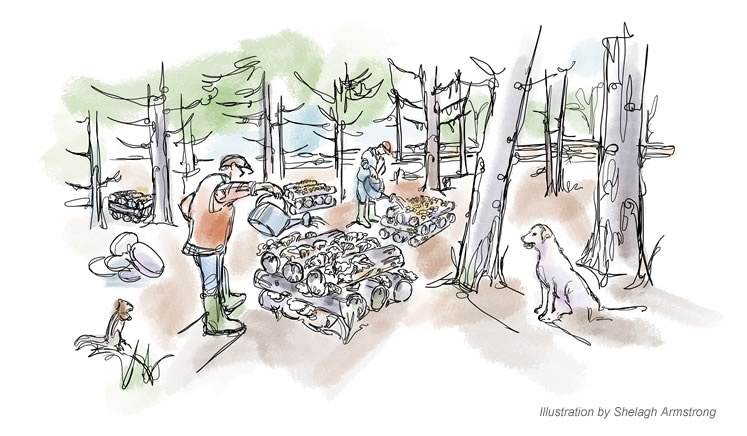Like Manna from Heaven
There is a lot of waiting around with mushrooms, just like there is in the military or the theatre or government roadwork.

About five years ago my eldest son developed a keen interest in mushrooms, and suddenly our front yard and garden were littered with stacks of logs he had inoculated with various strains of edible fungi. We couldn’t drive by a fallen hardwood tree without him stopping to ask if we could cut it up and take it home for “substrate” which is the technical term for host material for a fungus.
For a long time it looked like work without hope, just like the sheep, the pigs, the meat chickens, the henhouse or any of the myriad ways I have tried to produce food cheaply on this little plot of land we have lived on the past 30 years. There was a lot of chopping and sawing and drilling and inoculating, followed by regular soakings in the pond. Then there was an endless routine of stacking and restacking in various arrangements to take advantage of natural humidity and growing conditions.
“Don’t forget to water the logs,” my son would say on his way out to work. “Did you water the logs?” was the first question he asked when he got out of the car at the end of the day. There is a lot of waiting around with mushrooms, just like there is in the military or the theatre or government roadwork. The waiting eventually became my favourite part of mushroom cultivation. I’ve been waiting on and off without interruption for nearly five years now.
But this past year we were blessed with a wet fall and the mushroom farm suddenly came to life. Little buds of shiitakes would appear in the morning and by nightfall blossom into caps five or six inches across. The first half dozen we chopped up into an omelette and thrilled to the taste of our own locally produced, hundred-yard-diet, ethically sourced, totally organic but…significantly…not fair-trade mushrooms. The next dozen we made into soup. The next 30 dozen we put into bushel baskets.
My old neighbour Hughie used to say about whatever project we were working on together, “This can work as long as somebody doesn’t mind not getting paid.” I’m quite used to paying six dollars for a small handful of shiitake mushrooms at the store. But a funny thing happens when you show someone a bushel basket of them. It’s the same thing when you show them a basket of zucchinis or allow them to see a field with a million pumpkins in it. The price drops like a stone.
I like mushroom soup, every now and then. My son assures me these mushrooms and the rare wild reishi he has gathered in the bush are excellent promoters of mental clarity. I felt like I was already observing the world pretty clearly without the assistance of another cup of reishi tea.
“Can we find a commercial outlet for your mushrooms?” I asked. Then the frost hit and we were out of the mushroom business for another season. Luckily, we had a dehydrator to capture some of the surplus for future generations.
In the biblical story of the Israelites facing starvation in the desert, the Lord dropped manna from the heavens which the people were able to gather every day to feed themselves. Manna was not like corn or soybeans because it would break down and turn to evil-smelling mush the very next day, no matter how you tried to preserve it. You couldn’t put manna in jars on a basement shelf. And you couldn’t fill a silo with it and wait for the price to go up in January. There were no futures contracts in manna and no extension agent to come out from the agricultural college to let you know you were doing it all wrong.
So manna never became a thing. To become a thing in food production you have to find some sort of “biological lock,” a terminator gene or a sterility gene, and then you ramp up production and take over the world. There is only one major line of mushrooms in the store and that is Agaricus bisporus. You know it as a button mushroom or cremini or a portobello, but they’re all the same species, just different stages of the same fungus. It’s the only species that grows reliably indoors year-round, so naturally 90 per cent of the mushrooms we eat are Agaricus bisporus and it is a billion-dollar industry.
So, our log-grown shiitakes are never going to be a thing either. They will be like our free-range pork and eggs and meat chickens. They’ll be great Christmas presents and house-warming offerings, and a reminder that to every thing there is a season. And a time for every purpose under heaven.
Related Stories

Road Rage Comes to Town
Sep 24, 2021 | | Fence PostsFor generations the only people in Canada who had a good word to say about Toronto were the ones living there. Now thousands of them have left to live here.

It’s the End of the World … Again
Jun 22, 2021 | | Fence PostsAs a scribbler I have always walked down the sunny side of the concession roads.

Who You Gonna Call?
Mar 31, 2021 | | Fence PostsA country house has a lot of moving parts that can stop moving at any moment.

No Cause for Alarm
Nov 24, 2020 | | Fence PostsGiven the choice between a Rolex watch and a 1948 Champion root pulper that weighs 500 pounds and needs sharpening, the burglar is more likely to take the watch.








